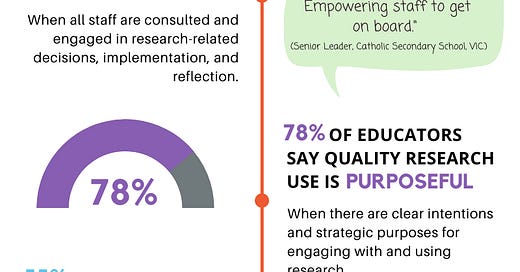A little paper on research use in school, that features a clever little letter ‘ß’ which looks like a paper clip when you pull it out of the stapler. In German orthography, the letter ẞ, called Eszett and scharfes S, represents the phoneme in Standard German when following long vowels and diphthongs. Cool huh!
So the big question of research use and ‘research-informed schools’ is, does it help? And the answer is mostly nah.
What do teachers do to improve stuff? “instead of using data or evidence, research findings indicate that school leaders and practitioners reportedly preter to rely on intuition during data based decision-making (Vanlommel et al., 2017), which is prone to confirmation bias and mistakes.” (Groß Ophoff et al., 2023, P. 5). Unlike research, which is, umm, better? :)
What about professional reading? “even though teachers and school leaders report to read professional literature regularly (VanLeirsburg and Johns, 1994; Lankshear and Knobel, 2004; Broemmel et al., 2019), there appears to be a strong preference for practical or guidance journals with no or only limited evidence orientation (Hetmanek et al., 2015; Rochnia and Gräsel, submitted), 'This inclination appears to be rather stable, as it is already observed in initial teacher education (Muñoz and Valenzuela, 2020; Kiemer and Kollar, 2021).” (Groß Ophoff et al., 2023, P. 5). This brings forth the essential delineation between ‘research’ as holier than though, and pieces informed by teachers extended experience is just of much lesser value. Which can be true, but not all research is magic and not all experience is useful.
So everyone in the UK seems to be on the research push, but, “As stated above. there is - on one hand - a push by governments toward school and teacher engagement with research, evidence, and data in order to drive school "self improvement; on the other hand, a lack of evidence suggesting that this actually has any materially positive outcomes for students.”
(Groß Ophoff et al., 2023, P. 6). Gulp, no impact, positively on students, oh that’s not cool.
And what do we do to people who want to research? Oh they need help to get there - Skill wise. “Even though the authors remain quite vague as to how particular levels of expertise can be reached, they see potential in practical training that is supported by academic mentors for pre-service teachers. for in-service teachers, they propose coaching (e.g.. Huguet et al., 2014) or establishing professional learning communities a.o. Brown, 2017; Brown et al., 2021 based on long-term and goal-oriented engagement with research. But obviously. the current conditions in the English educational political context are not favorable in that regard.” (Groß Ophoff et al., 2023, P.14). So PL strength suggests that coaching and PLCs are the best method, but we just can’t afford it.
The circle continues to be a square - best methods remain widely understood, but no one is paying for them. Does research help, nah not really, at least not upon student results. So onwards with more thinking and considering.
References
Groß Ophoff, J., Brown, C., & Helm, C. (2023, January). Do pupils at research-informed schools actually perform better? Findings from a study at English schools. In Frontiers in Education (Vol. 7, p. 935). Frontiers.
Running Word Count (the second 100,000): 19,991





